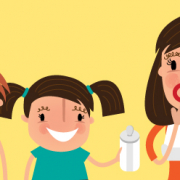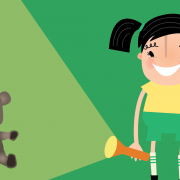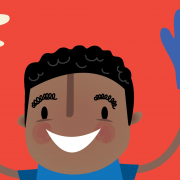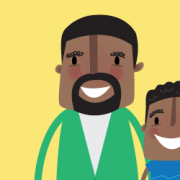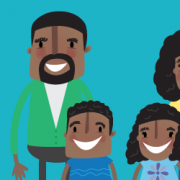To begin, set up some dominoes standing up on their ends, close enough to each other to start a train of toppling dominoes.
Have one of your children start the chain reaction by pushing the first dominoes tile down. (Be prepared to rebuild the dominoes train so each child can have a chance to start it.)
Explain to your kids that when people’s feelings get hurt, they can act like dominoes: one little word or deed can trigger a whole chain reaction of unhappy events.
For example, an older sister might tell her younger brother that he is acting like a baby. The brother then calls his sister a bossy bully and a fight begins. By the end of the fight, feelings are hurt, their parents are not happy, and the kids’ have their toys and other privileges taken away. When we say things before we take time to consider the feelings of others, we can start a chain reaction that can have far larger consequences than we ever expected.
Now work with your kids to build one final dominoes train, but after every 8 to 10 dominoes tiles, leave a safety space so the whole train does not come down if one section falls. Show your children how these gaps prevent “runaway trains.”
Use the following discussion questions to explain how the dominoes train helps remind us to be considerate.
Questions for discussion
- What happened when the first dominoes tile was pushed over?
- How much effort did it take to knock down a long line of dominoes?
- Could you stop the dominoes train once it started?
- How are people like dominoes?
- What kinds of things happen to you to make you feel like your emotions are tumbling down out of control, like the dominoes did?
- What kind of things can you do to create “safety gaps” when you’re upset – the things that help you regain control of your emotions instead of letting them be like a runaway train?
Next, have fun talking through or role playing through the following scenarios:
Scenario 1:
Jennifer’s mom told her that she couldn’t have ice cream until her little brother went down for his nap. Just as her mom was taking her brother to his room, Jennifer called out to her brother, “Have fun napping. I’ll be eating ice cream!”
How did Jennifer start a dominoes train?
Proverbs 12:23 “A prudent man conceals knowledge, but the heart of fools proclaims folly.
”
Scenario 2:
Todd’s cousin Jeff was over at Todd’s house and they were playing with building blocks. Jeff decided to have a pretend hurricane blow down the building Todd had just worked very hard to build. Instead of yelling at Jeff, Todd excused himself to go to the bathroom where he prayed and got himself under control before coming back to rebuild his building.
How did Todd stop the dominoes train?
Proverbs 29:11 “A fool gives full vent to his spirit, but a wise man quietly holds it back.
”
Scenario 3:
At breakfast Stephanie is so excited about her up-coming preschool field trip that she keeps kicking Bryce under the table. She’s talking non-stop about how much fun it’s going to be to go to the petting zoo. Bryce thinks it’s babyish to be that excited about it and he is tired of being kicked. He decides not to say anything at all and moves his chair out of the way of Steph’s flailing legs.
How did Bryce stop the dominoes train?
Colossians 3:13 “. . . bearing with one another and, if one has a complaint against another, forgiving each other; as the Lord has forgiven you, so you also must forgive.
”
Scenario 4:
Amanda is at her friend Jessica’s house. Jessica starts saying unkind things about one of their other friends, complaining, “Megan always brings her baby toys when she comes to play over here.” Amanda is quiet. Her friend Jessica then says, “Do you like the way Megan laughs all the time? I don’t.” After a moment Amanda says, “Megan is my friend too. I wouldn’t like it if you said that about me when you and Megan played together. Let’s try and think of nice things to say about her instead.”
How did Amanda stop the dominoes train?
Ephesians 4:29 “Let no corrupting talk come out of your mouths, but only such as is good for building up, as fits the occasion, that it may give grace to those who hear.
”
Scenario 5:
Reece is waiting in a lineup to use the washroom at school. A younger boy comes and pushes into line ahead of him. Reece gets mad and tells the other kid to get to the back of the line. The boy starts to cry and says he has to go really bad.
How could Reece have stopped the train?
1 Corinthians 13:4-5 “Love is patient and kind; love does not envy or boast; it is not arrogant or rude. It does not insist on its own way; it is not irritable or resentful . . .
”
Scenario 6:
Janna notices that her mom looks like she’s feeling sad. Janna gives her a hug and says, “Mom, I love having you for my mom.” Right away Janna’s mom seems to feel better.
How did Janna stop the dominoes train?
Proverbs 16:24 “Gracious words are like a honeycomb, sweetness to the soul and health to the body.
”
Scenario 7:
Connor walks into the playroom and notices that the train track he set up has been messed up. Connor yells at his younger brother, “You brat! What did you do to my train track?”
What did Connor do to start a dominoes train?
Proverbs 3:30 “Do not contend with a man for no reason, when he has done you no harm.
”
Scenario 8:
Jack and Jordan are playing hockey on their driveway. They get into an argument about whether Jordan’s shot is a goal. Jack yells, “You always make it so that you win!” Instead of yelling back at his brother, Jordan says, “You’re right, I often decide the close calls. I’ll take the goal back.”
How did Jordan stop a dominoes train?
Proverbs 15:1 “A soft answer turns away wrath, but a harsh word stirs up anger.
”
Scenario 9:
Missy is David’s younger sister. Their grandma is visiting and they are about to play a game that their grandma hasn’t played before. Missy is explaining the rules, but David grows impatient and says, “Quiet Missy! I can tell Grandma the rules better than you.” Missy starts to cry and doesn’t want to play the game anymore.
How could David have stopped the dominoes train before it started?
What could Missy have done to stop the dominoes train?
James 1:19-20 “Know this, my beloved brothers: let every person be quick to hear, slow to speak, slow to anger; for the anger of man does not produce the righteousness of God.
”




